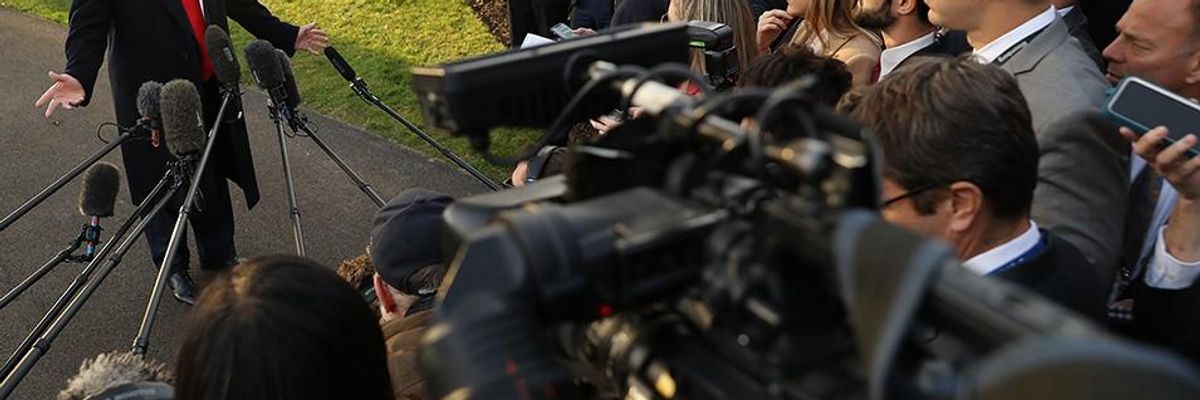However, any premature claims by the President -- or by Joe Biden, for that matter, though there is no equivalent fear of that happening -- will be wrapped in televised context, with vigorous corrections and visual proof that the race is too close to call.
One plan publicly described by NBC News president Noah Oppenheim has been echoed by leaders at other networks, including CNN.
"We are prepared to aggressively fact-check any effort by anyone to mischaracterize the status of the race or the results of the race prematurely," Oppenheim told The Hollywood Reporter.
But is that enough? The Trump era has prompted unusual questions about the ethics of broadcasting and repeating egregious political lies.
"I think there's a very tough decision for the networks about taking Trump live on election night, particularly if you know he is going to come out and lie and sow dangerous disinformation about the election," MSNBC host
Chris Hayes tweeted on Sunday amid news reports about the possibility of a premature victory claim.
On Monday an MSNBC spokesman declined to comment on how it might handle such a scenario.
The question at hand: Should the networks act as gatekeepers and decline to broadcast Trump's claims, unfiltered, to tens of millions of Americans, or is their role to show news as it happens?
Many liberals believe American networks are guilty of airing far too many Trump falsehoods far too often. Conversely, many conservatives believe networks other than Fox News exercise too much restraint already.
Inside newsrooms, one common response to this predicament is, simply, "he's the president." The belief that an elected leader's words are inherently newsworthy, even when wrong, and must be heard, then fact-checked if necessary.
ABC News chief anchor George Stephanopoulos alluded to this view in an interview with
The New York Times about Election Night: "I don't think we can censor the candidates," he said. "But we have to be vigilant about putting whatever comments are made in context, with everything we know about where the race stands, where the law stands, where the votes are."
That seems to be the consensus view within the major networks, although some staffers are agitating for a harder line on Trump, given his history of lie-filled speeches.
One industry source, on condition of anonymity, did sketch out a possible scenario in which networks opt out of carrying Trump live: If there is widespread violence and newsroom leaders have reason to believe that Trump will pour gasoline on the proverbial fire.
In response to questions about possible premature claims of victory, a spokeswoman for CBS News said, "we will report a candidate's claims, however, we will only make projections based on our Decision Desk's data and statistical models."
On CNN's "Reliable Sources" Sunday morning, CNN Washington bureau chief Sam Feist said election coverage will be data-driven.
"Once you start counting and reporting the votes, the spin and the time for spin is over," he said. "On election night, we're going to talk a lot about numbers. We're going to look in great detail at the numbers, where the votes are coming from, how many of them are mail-in ballots early, in-person Election Day ballots. But we're not going to spend a lot of time paying attention to spin. We're really going to focus on the data."
Feist and other experts have emphasized that election projections may take longer this year due to the pandemic and the huge surge in mail-in ballots. "Just because it takes longer doesn't mean that anything is wrong. And we have to all remember that," he said.
But there are widespread fears that Trump will seize on possible delays in order to shape public opinion -- and claim he has been re-elected.
Social media platforms like Facebook and Twitter say they will take their cues from the major networks and The Associated Press.
Twitter and Facebook both said Monday that they will rely on the decision desk projections made by major networks and The Associated Press.
Twitter said that it may apply a warning label to tweets by candidates, campaigns and other highly visible accounts that attempt to claim victory before official results have been declared.
"Beginning on election night through the inauguration, we will label some Tweets that make claims about election results," Twitter said in a blog post. "We will be prioritizing the presidential election and other highly contested races where there may be significant issues with misleading information based on the below criteria."
Facebook said that "if a presidential candidate or party declares premature victory before the race is called by major media outlets above," the platform will "add more specific information in the labels on candidate posts" and "add more specific information in the top-of-feed notifications."

